Preventing Errors and Pitfalls in Nursing with Infectious Patients » książka
topmenu
Preventing Errors and Pitfalls in Nursing with Infectious Patients
ISBN-13: 9783030867270 / Angielski / Miękka / 2022
This book informs nurses about the most common and the more serious errors made in caring for patients with infectious diseases. It provides learnings about a variety of infectious diseases, including COVID-19, methicillin-resistant Staphylococcus aureus (MRSA), Vancomycin-resistant Enterococcus (VRE), Clostridium difficile (C-diff.), and tuberculosis (TB), amongst others. Factors that are predisposing and contributing factors for nursing errors are reviewed. The types of errors, consequences, detection, and monitoring for nursing errors are included.
This book examines how errors can be avoided with necessary precautions, and managed appropriately based on current evidence-based practice. Recommendations for further study are also provided. This book is a useful tool for nurse educators/ leaders/mentors to educate and guide their students and professional nurses.











